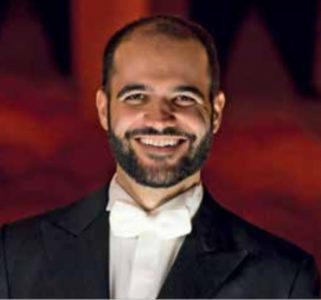I was fortunate to work with people who passionately love their job and showing that every day; from director and singers to the orchestra and all those people who have been tirelessly working on the stage
The premiere of Verdi’s Rigoletto, performed by the Serbian National Theatre, officially opened the Theatre’s opera festival called Operaria. Over 1,000 members of the audience, filling ever single seat in front of the Jovan Djordjevic Stage, were thrilled by the performance. All the performers and the conductor of this op-era, Andrea Solinas received a long-standing ovation and thundering applause for their musical, vocal and acting performance of Shakespearean fortitude.
festival called Operaria. Over 1,000 members of the audience, filling ever single seat in front of the Jovan Djordjevic Stage, were thrilled by the performance. All the performers and the conductor of this op-era, Andrea Solinas received a long-standing ovation and thundering applause for their musical, vocal and acting performance of Shakespearean fortitude.
You conducted your last concert at the Serbian National Theatre (SNT) in Novi Sad only recently. What memories of your engagement with the SNT are you going to take with you?
— On June 14th, I conducted the premiere of Verdi’s Rigoletto at the Serbian National Theatre. That was a wonderful experience for two main reasons: first of all, I conduct-ed this opera for the first time ever and this is an opera that has great depth and musical complexity. I was fortunate to work with people who passionately love their job and showing that every day; from director and singers to the orchestra and all those people who have been tirelessly working on the stage. What performance at the SNT will you remember the most and why?— Rigoletto is, for now, my first real and the biggest production at the SNT. Since April, I have been working as an assistant to maestro Gianluca Marciano, the principal conductor at the SNT, on a lesser-known opera by Liszt called Sardanapalo, which opened the NOMUS Festival. I had the luck to lead and prepare the orchestra, soloists and choir from the very first rehearsals to the general rehearsal. There, I had the opportunity to enjoy the very pleasant atmosphere and professionalism of all the artists who took me seriously and treated me with great respect from the very first rehearsal. I encountered the same atmosphere in June too. Thanks to that, I could seriously work and succeed in creating nice energy during the rehearsals and at the premiere.
What is generally the hardest thing for you in the opera – performing or preparing?
— Certainly, the hardest part of me relates to concentration, i.e. focus-ing on everything that precedes the performance. I have to establish contact first with soloists and choirs, and then with the orchestra. This is both a musically and psychologically demanding job. You have to know the score as well as possible, but at the same time, you have to be apt at conveying your thoughts to all participants, over 100 of them. During the orchestra’s rehearsal, you have to listen well and have a clear idea of what is wanted and what can be required. All of this demands extraordinary concentration and energy. During the performance, I am much calm-er (my focus does not slip for a second) and I enjoy the music.
How did you decide to come from Italy to Serbia and conduct opera?— In 2017, I worked as a music director for the Foundation of the Puccini Opera Festival in Italy (I am still working with them). I met maestro Marciano after one of the performances of the opera Tosca. From that meeting onwards, we formed a relationship of mutual trust and respect and in 2018, I came to Novi Sad as a pianist, to give masterclass to singers and pianists for Puccini’s opera Mad-ama Butterfly. From that moment on, we formed close cooperation which resulted in me conducting Rigoletto in June. What impressions do you have of our country?— Serbia is similar to Italy in many ways – its way of life, the open and socially pleasing character of people resembles a lot the people in my Italy, especially in my Sardinia, the region where I was born. People here seem to be closed off at first, but in a matter of minutes, you establish a beautiful relationship of respect and trust. I like the food, especially the meat (I love ćevapčići) and the nature that surrounds this exceptionally beautiful city. The keywords that I associate Novi Sad with are peace and prosperity.
In other countries, a conductor is considered an institution. Is this also true for Serbia?
— The conductor is an indispensable figure in the orchestra and opera. The entire responsibility for good performance lies on him, but I think that the conductor is an integral part who, together with everyone else, creates a big picture. The conductor can be an institution, but if he does not have all the parts of the orchestra and the singers, and if he lacks the will to create something, then he loses all his power. The success of production does not rest solely on the conductor’s aptness, but on the passion that everyone from their respective segments manages to convey. The task of the conductor lies in the ability to extract that energy from everyone.